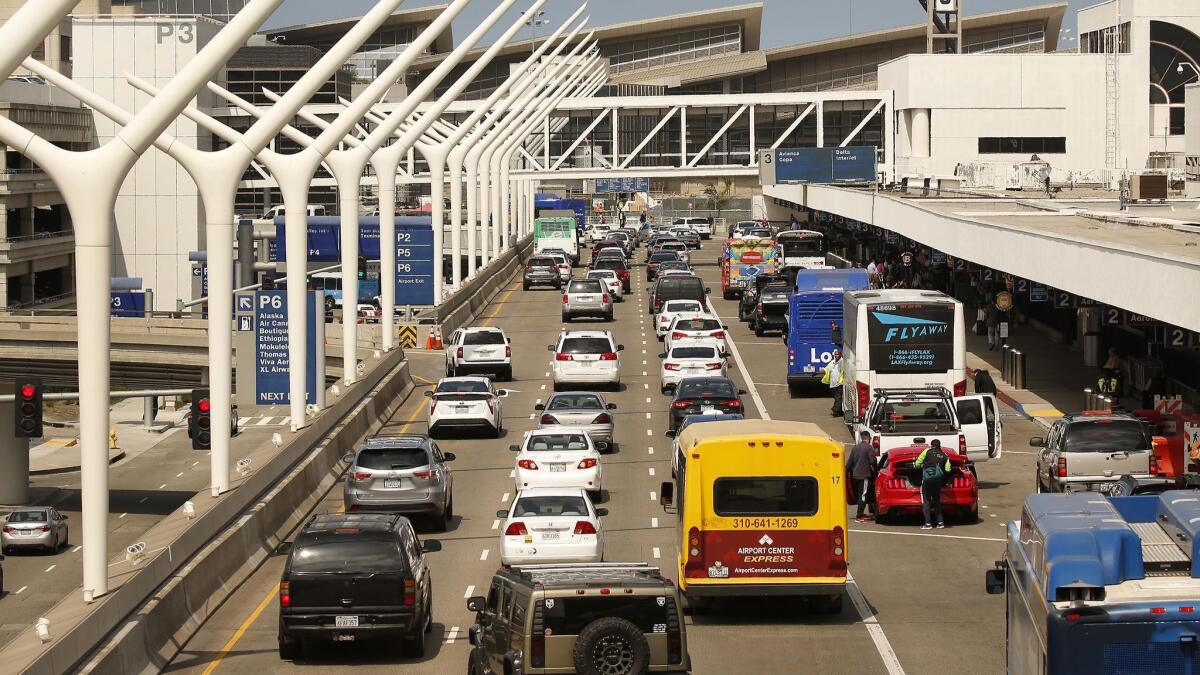Car-sharing firm says LAX and Enterprise are colluding to keep it out of airport

- Share via
In the latest dispute over how to regulate the sharing economy, a peer-to-peer car-renting company filed a lawsuit against Los Angeles International Airport on Thursday, claiming the airport wants to impose the fees and permit requirements of a full-blown rental car company on the online firm.
In a statement, LAX said the airport has not seen the lawsuit filed by the car-sharing company, Turo, but added that Turo has been operating at the airport without a permit for two years and has been contributing to its traffic and congestion.
In a lawsuit filed in U.S. District Court in Los Angeles, Turo blames Enterprise Rent-a-Car for pushing LAX and other airports across the country to impose such fees and permits on the peer-to-peer car-sharing business because the rental car company fears the competition.
“Enterprise views Turo as an existential threat and has gone on the offensive to exclude Turo and its users from airports nationwide,” the lawsuit stated.
Using the Turo app, travelers can rent a car owned by other Turo users. More than 10,000 car owners have listed their vehicles with Turo, according to the lawsuit.
At LAX, a transaction can take place at the airport’s short-term parking lot or the car owner can pick up the renter from the curb at a terminal and make the transaction for the car at a nearby location.
Michelle Fang, chief legal officer for Turo, said the airport has been pushing her company to pay the type of fees charged to rental car companies even though Turo operates no desks, counters or facilities at or near the airport.
LAX has asked that Turo pay 10% off the gross of each rental, plus a $37 facility charge on each car rented at the airport, according to the lawsuit. Instead, Fang said, Turo wants to be treated more like the ride-hailing services Uber and Lyft, which pay the airport a fee of only $4 for every pickup at the airport.
After months of negotiations, LAX officials last year began to allow Uber and Lyft to pick up and drop off passengers from the curbs at the terminals. The ride-hailing companies are now permitted to operate out of most Southern California airports.
s
Through Freedom of Information Act requests, Turo officials said they have obtained letters from Enterprise, urging airport officials in Las Vegas, Los Angeles, Salt Lake City and Denver to clamp down on Turo operations.
“Enterprise is quite threatened by our growth and our popularity,” Fang said.
Turo had previously filed a similar lawsuit against San Francisco International Airport over the fees proposed at that airport, she said.
In a statement, Enterprise accused Turo of orchestrating a campaign “to distract from the undisputed truth that they are providing rental car services. And they continue to try to receive special treatment for their car rental business from the government” by avoiding the fees and permits that rental car companies face.
Enterprise also owns the National and Alamo rental car companies.
A representative for the American Car Rental Assn., the trade group that represents Enterprise and other rental car companies in the United States, said it has been pressing regulatory agencies across the country to treat Turo and other peer-to-peer car-sharing business like rental car businesses.
“The industry doesn’t seek to keep anybody out of any place,” association spokesman John Barrows said. “But if a company rents cars at airports, the regulations and laws should apply to everybody.”
Twitter: @hugomartin
UPDATES:
3:40 p.m.: This article was updated with a statement from LAX
3 p.m.: This article was updated with a statement from Enterprise Rent-A-Car.
This article was originally published at 2:25 p.m.
More to Read
Inside the business of entertainment
The Wide Shot brings you news, analysis and insights on everything from streaming wars to production — and what it all means for the future.
You may occasionally receive promotional content from the Los Angeles Times.











